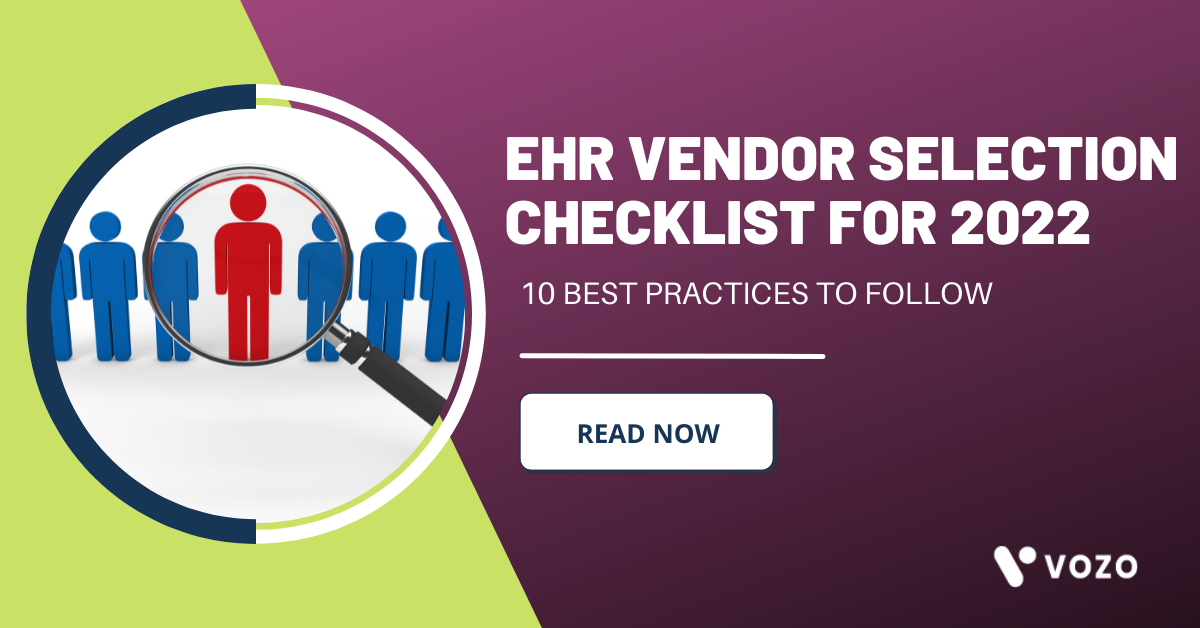EHR Vendor Selection Checklist For 2025 (New)
The digital healthcare transformation continues to grow and evolve, but 2022 will likely hold some dramatic changes. Healthcare organizations must not only plan for the future of digital tools but be prepared to take advantage of them. Here is the checklist with the top 7 best practices for EHR vendor selection in 2022.
1. Understanding your need: EHR vendor or EHR system
Some don’t be satisfied with their EHR vendors and some won’t be satisfied with the best EHR software features offered by the EHR vendors. There is a lot of difference between them both.
If you wish to have advanced EHR features like telehealth integration then change your EHR systems. If you wish to improve your EHR process at a low cost and in an effective manner, then give it a try to a new EHR vendor.
So, understanding your need will help you to make a better and more informed decision with EHR.
2. Select the type of EHR system for your practice
In today’s digital world, the most common types of EHR systems used by the top healthcare organizations are cloud-based EHR, web-based, SaaS-based and self-hosted. So, understand the benefits, features, and challenges of each EHR type before making the right decision.
3. List out the EHR features you need for your practice
The EHR software holds a lot of features and not all the features are important for you. Some of the features might be more important to others than to you. So, first, define your practice goals and your patient needs from your EHR to identify your suitable features.
READ MORE: Checklist To Find The Best EHR For Your Practice
4. Start building your team
Secure full support from your stakeholders who are responsible for medical practice, clinical operational, and financial functions. The key goals should include,
- Increased operational efficiency
- Improved medical billing operations
- Improved patient scheduling
- Reduced documentation time for clinicians
5. Choose the right EHR vendor
Currently, there are about 1000+ EHR vendors that offer EHR software. Hence, the process of choosing the best EHR vendor is complex. Here we have mentioned some useful tips to follow
Step 1: EHR Planning: Decide between Cloud-based EHR and locally hosted EHR solutions.Right EHR Vendor
Step 2: Set Goals That Can Be Achievable Through EHR Benefits
Review the current goals and objectives of the practice to determine the EHR benefits to be achieved.
Outline the scope and functional needs to achieve anticipated benefits from the EHR.
Review the practice’s key workflows.
Does the software work with your practice management system?
Create a matrix to compare EHR functions to benefits.
Step 3: Compare EHR Vendor Products.
“Best-fit” vs. “Best-of-breed” EHR software
Step 4: Request for Proposal
Develop a written RFP based upon the requirements.
Send the RFP to selected vendors asking them to provide an EHR proposal.
Evaluate proposals by EHR functionality to meet organizational needs.
Step 5: Vendor Selection and Contract Negotiation
Request a demo of the top 2-5 EHR vendors. If possible, request a usability test with test scenarios
Make the final decision.
Conclude purchase by negotiating all details related to the services required, including any ongoing maintenance.
READ MORE: How To Do EHR Implementation In The Right Way?
6. Know about EHR cost
According to the ONC, the cost of purchasing and installing an EHR system ranges from $15,000 to $70,000 per provider. The final price tag will depend on your specific requirements but keep in mind that the benefits of EHR software outweighs its cost.
To understand the total cost of ownership, it is important to understand the different components of the cost involved in the implementation of a new EHR or even the replacement of your existing EHR.
7. Question your EHR Vendor on Incorporation of New Technology
Healthcare analytics will become a normal part of your daily routine. It will enable you to gain even more insight into complex scenarios and diagnostic challenges. As part of the evaluation process, this is the right time to determine whether your new EHR system is ready for new Artificial_Intelligence_healthcare EHR technologies like machine learning and artificial intelligence.
Here are some important questions to ask your vendor:
- What is your roadmap to enable artificial intelligence into your EHR?
- How do you plan to enhance the electronic information provided to doctors by the power of analytics and machine learning?
- In terms of data quality, how sophisticated is the system’s data validation? e.g. the user should not be allowed to enter a heart rate of 1 or a respiratory rate of 250!
- Does the system provide a query tool and understand SQL?
- Do the exported files have a standard format (e.g. CSV, XLS, XML)?
- Is the content easy to understand? E.g. by humans and software (Tableau, Excel)
- Do the exported tables have meaningful headers and correct date/time stamps?
Vozo EHR Software for your practice.
In an increasingly connected world, your approach towards choosing the right EHR software should be unique. We create customized EHR software solutions for your healthcare practice by innovatively combining healthcare tools and technology while keeping the focus on end-user experience.
We focus on advanced EHR features like telehealth integration, e-prescribing to create better outcomes and boost your practice revenue.
Ready to consult with a Vozo expert?
Using our expertise, best practices, and advanced EHR features we provide actionable results based on your practice needs.
Ready to switch with new EHR software? Looking for the best EHR vendor? We are here to help. Reach out today to connect with a Vozo expert!
About the author

With more than 4 years of experience in the dynamic healthcare technology landscape, Sid specializes in crafting compelling content on topics including EHR/EMR, patient portals, healthcare automation, remote patient monitoring, and health information exchange. His expertise lies in translating cutting-edge innovations and intricate topics into engaging narratives that resonate with diverse audiences.













